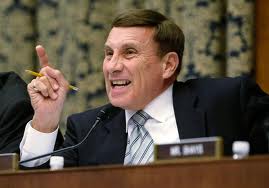“I want to congratulate you on your Committee’s approval of the ‘Moving Ahead for Progress in the 21st Century Act,” begins House Transportation Committee Chair John Mica’s letter yesterday to Sen. Barbara Boxer (D-CA), chair of the Environment and Public Works Committee.

From there, the letter changes tone:
However, I am concerned that the Senate two-year proposal does not address the fundamental problem of the long-term insolvency of our Highway Trust Fund. Your proposal will essentially bankrupt the Highway Trust Fund and make it impossible to provide any funding for fiscal year 2014.
The letter continues the debate between Mica and Boxer over how to supplement revenue from the national gas tax to fund transportation spending. It's Mica’s response to a letter he received from Boxer three weeks ago, in which she questioned whether or not his plan truly maintained current funding levels.
Mica agrees with Boxer that current funding levels should be maintained (though her bill calls for current spending plus inflation, which Mica hasn’t bought into yet). But he has a problem with the fact that the Senate hasn't identified the new sources of revenue necessary to do that. (He says he's working on that himself.)
Mica attached a CBO report showing Highway Trust Fund deficits beginning in 2014 under Boxer’s scenario. Boxer has said that with the additional $12 billion from some other, yet-unidentified source, her bill will keep the HTF afloat. Current levels of spending, funded only with Trust Fund receipts, would start creating deficits even sooner – the Highway Account would run into red ink this fiscal year and the Transit Account in the next fiscal year.
Of course, it stands to reason that the Senate proposal doesn't address 2014, since it's a two-year bill. Further, the CBO merely ran the numbers based on assumptions that Mica made, which are not universally agreed upon. For example, the fact that all contract authority and obligations limitations are zeroed out for 2014 and then come back for the following year. That's not a product of the money running out -- it's just the scenario Mica laid out.
In addition, Democrats note that Mica hasn't found a funding stream for his six-year proposal either. A bipartisan group in the Senate has at least figured out a way to keep things going for two years, with a commitment to keep working on the long-term solvency issue.
So what’s Mica’s solution to the funding predicament? He hasn’t publicly embraced the stated GOP path toward transportation solvency -- capturing revenue from fossil fuel extraction -- but neither has he spoken out against the idea of expanding oil drilling to fund infrastructure.
That plan is about to move forward another step in the House. When House Speaker John Boehner said the House would vote soon on a bill to expanding energy production, Streetsblog wondered if he was referring to one of the bills that have already been introduced, and we couldn’t get the answer out of anyone.
Then, lo, Rep. Steve Stivers (R-OH) announced he was introducing a third drilling-for-infrastructure bill: the American-Made Energy and Infrastructure Jobs Act. Stivers links concerns about “rising energy costs, high unemployment and our aging infrastructure” and proposes solving them by opening up “untapped oil resources in the Outer Continental Shelf that will raise revenue from new off-shore drilling leases and provide a new dedicated source of revenue to fund infrastructure projects.” For more detail, check out the bill language here [PDF].
The House Subcommittee on Energy and Mineral Resources is holding a hearing on that bill Friday morning, followed that afternoon with a hearing on the virtues of drilling in the Arctic National Wildlife Refuge (though not necessarily for infrastructure – that’s just for the fun of it).





